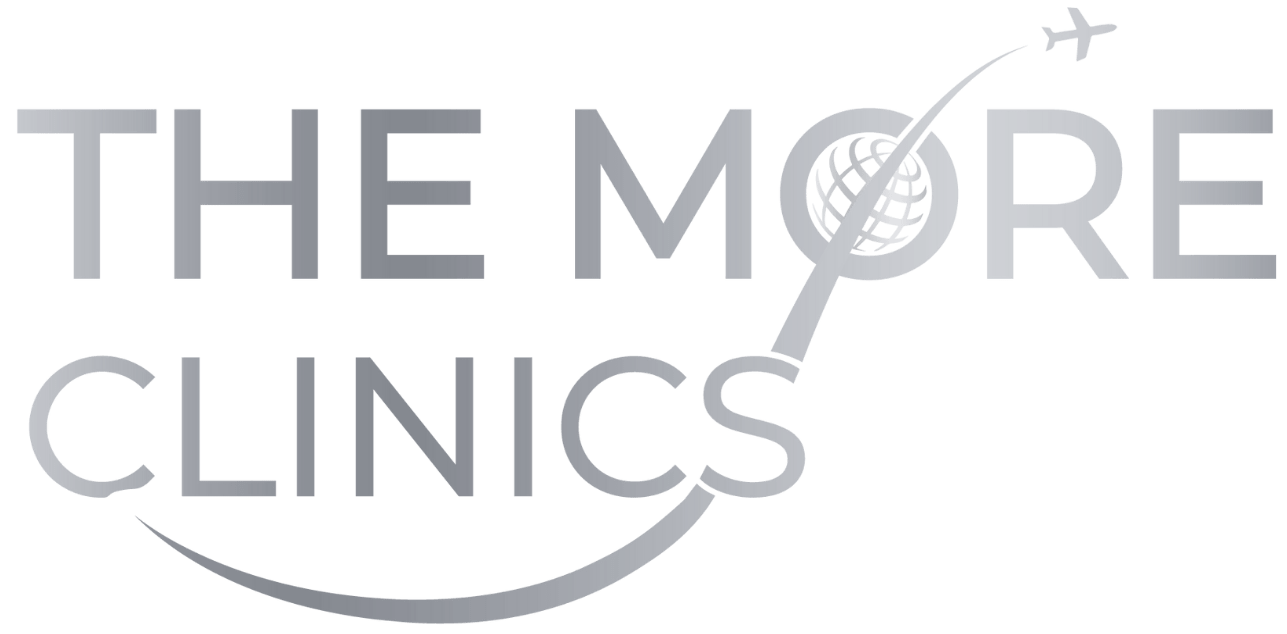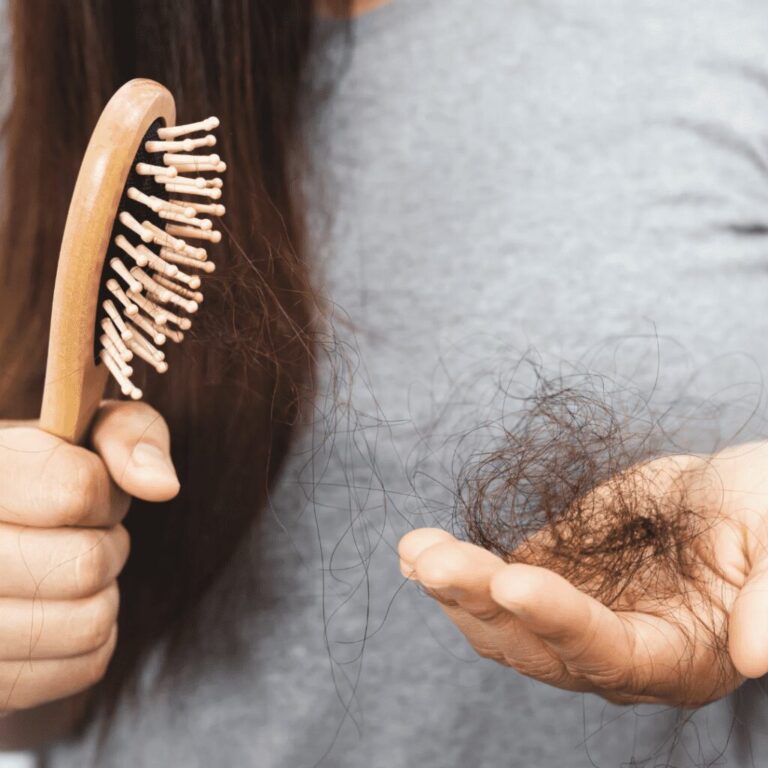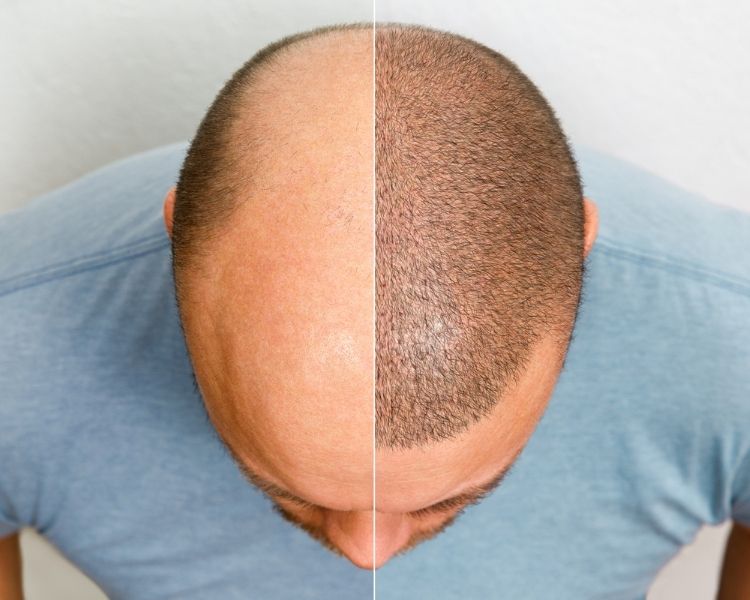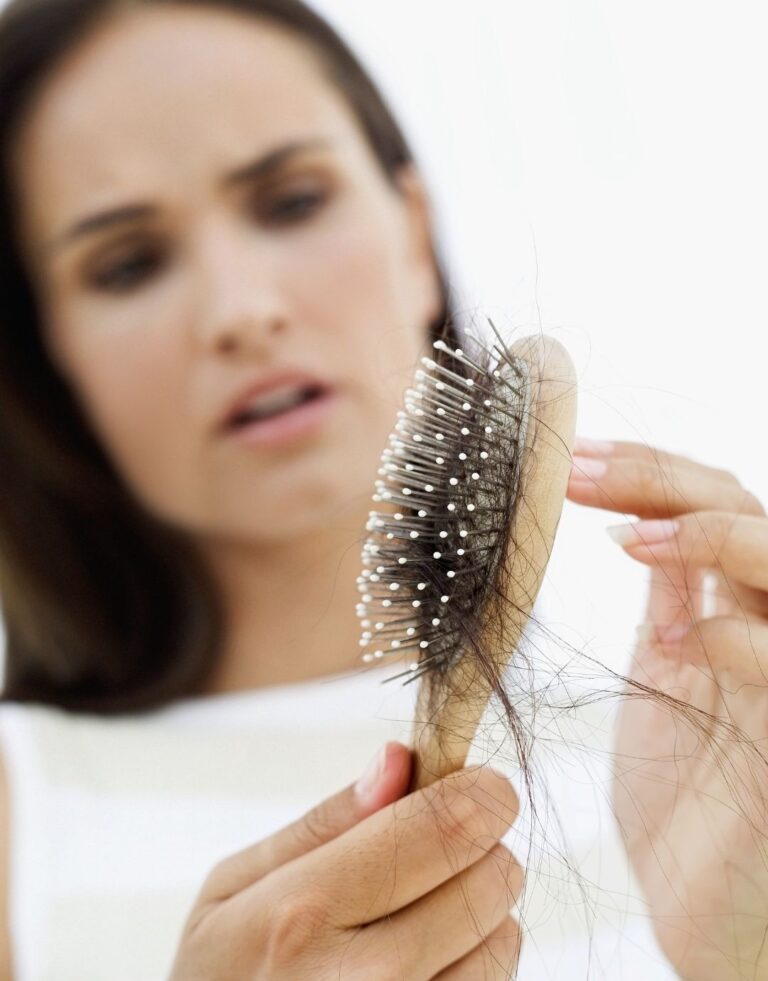10 Essential Oils for Hair Growth and Health
In recent years, essential oils have become incredibly popular due to their remarkable ability to enhance hair health. Whether you’re battling with balding, thinning hair, or simply aiming to expedite your hair’s growth, incorporating essential oils in your hair care regimen can work wonders. These oils have proven to be highly effective in promoting overall hair well-being and have gained widespread recognition for their numerous benefits that nourish the hair from root to tip.
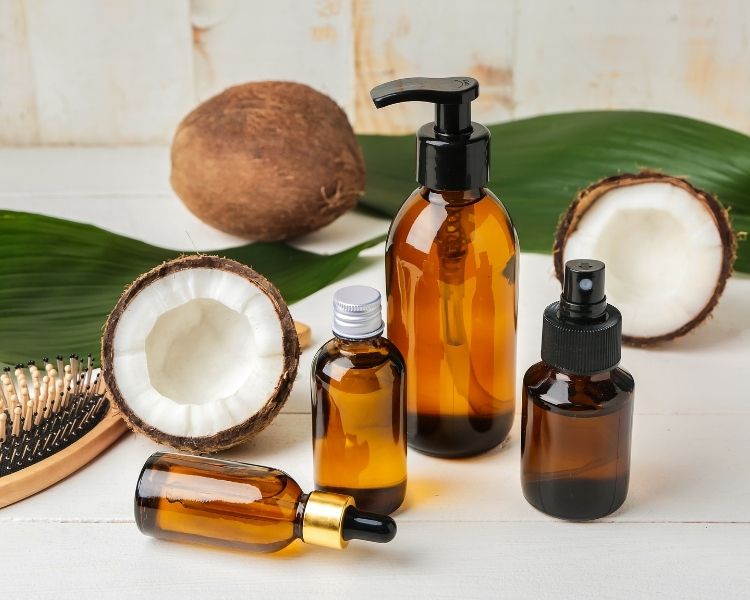
Are Essential Oils Beneficial for Hair Health?
From reducing hair loss to promoting hair thickness and shine, essential oils offer a holistic solution for various hair concerns. Studies have shown that certain essential oils, when used topically, can be as effective as traditional hair growth treatments. These include popular oils like peppermint, rosemary, and lavender.
However, it’s worth noting that the effectiveness of these oils may vary from person to person. Additionally, using them in combination with a healthy diet and proper hair care routine can further enhance their effectiveness.
How do Essential Oils works for Hair Growth?
Essential oils are highly potent and carry active compounds that can impart a range of benefits to hair. Scientifically, these oils work by stimulating the scalp and enhancing blood circulation, which in turn fosters the growth of hair follicles.
Furthermore, these oils possess antimicrobial and antifungal properties, thus keeping scalp infections at bay that can lead to hair loss. It’s crucial to remember that these oils should be diluted with a carrier oil before applying to the scalp to mitigate the risk of skin irritation and other potential side effects.
How to Use Essential Oils?
There are various ways to use essential oils for hair growth and health, including:
- Topical Application: The most common way of using essential oils is by topically applying them to the scalp and hair. This can be done through a gentle massage or by adding a few drops of oil to your shampoo or conditioner.
- Hair Mask: Adding essential oils to your DIY hair masks can provide added benefits for your hair. Simply mix the oils with natural ingredients like honey, avocado, or yogurt and apply it to your hair for a deep conditioning treatment.
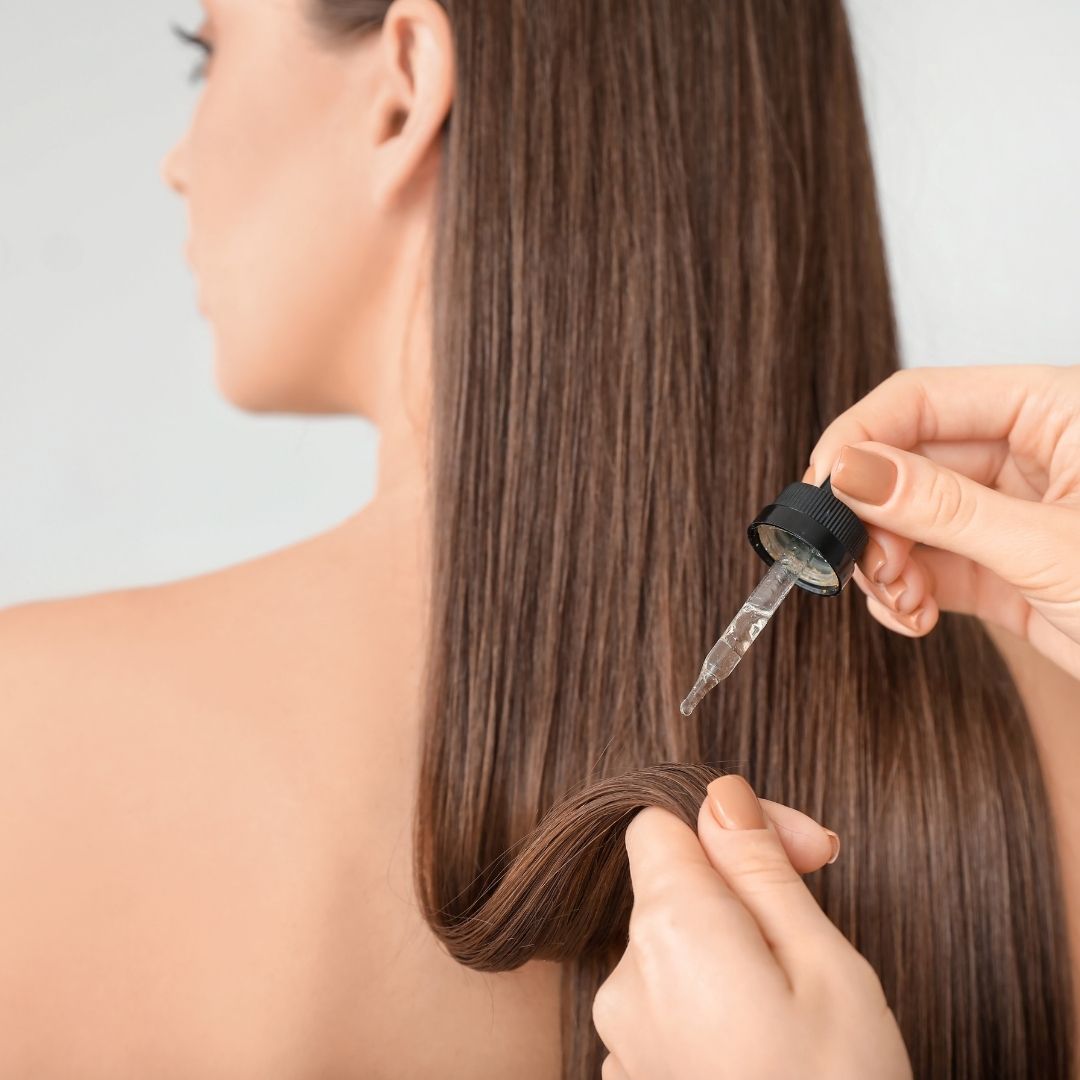
- Scalp Treatment: For targeting specific scalp concerns, such as dandruff or dryness, mixing a few drops of essential oil with a carrier oil and massaging it onto the scalp can help nourish and soothe the skin.
- Aromatherapy: In addition to the topical application, inhaling essential oils through aromatherapy can also provide numerous benefits. Simply add a few drops of oil to a diffuser or mix them with water in a spray bottle and mist it onto your hair and scalp.
10 Essential Oils for Hair Growth & Health
1.Lavender Oil
One of the most versatile essential oils, lavender offers a plethora of benefits for hair. It’s known for its calming scent and ability to reduce stress, which can indirectly contribute to healthy hair growth. Additionally, it possesses antiseptic properties that help cleanse the scalp and promote hair growth.
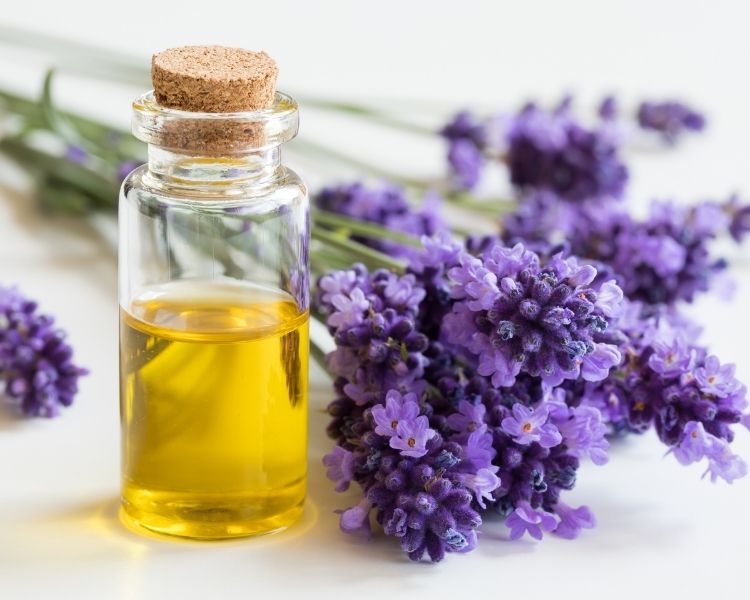
A study published in “Archives of Dermatological Research” found that lavender oil applied to mice made them grow more hair, and their hair grew faster than usual. The mice also showed a significant increase in the number of hair follicles, deepening of hair follicle depth, and thickening of the dermal layer. Although this study was conducted on mice, the promising results indicate the potential for a similar effect in humans, which warrants further research.
While these studies provide valuable insights, one should bear in mind that results may vary among individuals, and what works for one person might not work for another. As more research is conducted, we are sure to gain a better understanding of how essential oils can support hair health and growth.
How to Use Lavender Oil for Hair Growth and Health
Follow these steps to use lavender oil effectively for hair growth and health:
- Purchase High-Quality Lavender Oil: Make sure the lavender oil you buy is 100% pure and of high quality. It should not contain any additives or synthetic ingredients.
- Dilute the Lavender Oil: Essential oils are highly concentrated and can cause irritation if applied directly to the skin. Always dilute lavender oil with a carrier oil before application. A good ratio is 2-3 drops of lavender oil for every tablespoon of carrier oil (like coconut oil or jojoba oil).
- Apply the Mixture to Your Scalp: Using your fingertips, gently massage the diluted lavender oil into your scalp. Focus on areas where your hair is thinning if hair loss is a concern.
- Leave it On: Allow the lavender oil to sit on your scalp for at least 10 minutes. This gives the oil enough time to penetrate the scalp and hair follicles. For a more intensive treatment, you can leave it on overnight.
- Rinse it Out: After letting the oil sit, rinse it out with your regular shampoo. You might need to shampoo your hair twice to fully remove the oil.
- Repeat Regularly: For best results, repeat this process 1-2 times per week.
Remember to perform a patch test before applying lavender oil to your entire scalp to ensure you do not have an adverse reaction. If you experience any discomfort or irritation, discontinue use immediately.
2.Peppermint Oil
Peppermint oil is known for its cooling effect on the scalp, which enhances blood circulation. This stimulates hair follicles and promotes hair growth.
Another study demonstrated that peppermint oil resulted in hair growth in mice by inducing the rapid anagen stage, which is the growth phase of a hair follicle. It was found to be more effective than minoxidil, a common hair growth treatment. However, more research is needed to determine how peppermint oil affects hair growth in humans.
How to Use Peppermint Oil for Hair Growth and Health
The initial three steps mirror the utilization of lavender oil, while the subsequent steps can be followed as outlined below:
- Leave it On: Leave the oil on your scalp for 15-20 minutes to allow it to penetrate the hair follicles and stimulate blood circulation.
- Rinse and Shampoo: Rinse out the oil with your regular shampoo, making sure to thoroughly remove all the oil. You can also use a mild conditioner after shampooing.
- Repeat Regularly: For best results, repeat this process 1-2 times per week.
As with any essential oil, it’s important to perform a patch test before applying peppermint oil to your scalp. If you experience any discomfort or irritation, dis
3.Rosemary Oil
Rosemary oil is rich in antioxidants and can prevent premature graying of hair.
It’s also effective in promoting hair thickness.
In a study published by “Evidenced-Based Complementary and Alternative Medicine,” it was found that rosemary oil increased hair thickness, reduced hair loss, and improved scalp health in participants with androgenetic alopecia (male pattern or female pattern baldness).
Rosemary oil can be used in a manner similar to the previous essential oils for hair growth and health. Firstly, ensure you obtain a pure, high-quality variant of rosemary oil. Dilute it using a carrier oil at a ratio of 2 to 3 drops of essential oil per tablespoon of carrier oil. Apply the mixture to your scalp, concentrating on areas of thinning hair if applicable. Leave the oil on your scalp for around 15-20 minutes to ensure it penetrates the hair follicles adequately. After the time has elapsed, rinse out the oil using your regular shampoo, ensuring all oil is removed. Repeat this process at least once or twice a week for best results. Always perform a patch test to avoid any potential adverse reactions.
4.Tea Tree Oil
Tea tree oil is an excellent remedy for dandruff and itchy scalp. By keeping the scalp healthy, it indirectly supports hair growth.
A study found that a shampoo containing 5% tea tree oil effectively treated dandruff, with participants reporting significant improvement in itchiness and greasiness of the scalp. By keeping your scalp clean and free of dandruff, you can promote healthy hair growth.
To use tea tree oil for your hair, follow the same initial steps of dilution and application to the scalp. Leave it on for 5-10 minutes before rinsing out with shampoo.
You can also add a few drops (10 drops) of tea tree oil to your regular shampoo as an alternative method of use. Repeat this process 1-2 times per week.
5.Cedarwood Oil
Cedarwood oil can balance the oil production in the scalp, making it suitable for both dry and oily hair. It can also reduce hair loss because of its antifungal and antibacterial properties.
In a study published in “Archives of Dermatology,” participants with alopecia areata (an autoimmune disorder causing hair loss) underwent scalp massages using essential oils including cedarwood oil. After seven months, 44% of participants showed significant improvement in their hair growth.
To use cedarwood oil for hair growth and health, dilute it with a carrier oil of your choice and apply to the scalp. Leave it on for 15-20 minutes before rinsing out with shampoo. Repeat this process once or twice a week.
6.Clary Sage Oil
Clary sage oil regulates oil production and strengthens hair.
It’s particularly effective for those with oily hair.
In a study published in “Journal of Phytotherapy Research,” it was found that clary sage oil can increase hair thickness and reduce sebum (oil) production on the scalp.
To use clary sage oil for your hair, mix 2 or 3 drops with a carrier oil (1 tablespoon) and apply to the scalp. Leave it on for 15-20 minutes before rinsing out with shampoo. Repeat this process once or twice a week.
Alternatively, you can enhance your shampoo or conditioner by adding 3 drops and using it daily. However, if you choose to use it daily, ensure you wait only 2 minutes before rinsing it out.
7.Ylang-Ylang Oil
Ylang-ylang oil can help balance the scalp’s pH levels, making it ideal for those with a dry scalp. It also promotes hair growth by nourishing the hair follicles and increasing blood flow to the scalp.
In a study published in “Journal of Cosmetic Science,” participants who used ylang-ylang oil reported less hair breakage and increased hair elasticity after several weeks of use.
To use ylang-ylang oil for your hair, mix it with a carrier oil (such as coconut or jojoba oil) and apply to the scalp. Leave it on for 15-20 minutes before rinsing out with shampoo. Repeat this process once or twice a week.
8.Chamomile Oil
Chamomile oil is a gentle oil that soothes the scalp and adds shine to hair. It’s great for those with sensitive skin.
In a study published in “Phytotherapy Research,” participants with scalp psoriasis (a skin condition causing itchy, scaly patches on the scalp) applied chamomile oil topically. After 6 weeks, significant improvements were seen in their scalp condition.
To use chamomile oil for your hair, mix it with a carrier oil (such as almond or olive oil) and apply to the scalp. Leave it on for 15-20 minutes before rinsing out with shampoo. Repeat this process once or twice a week.
9.Thyme Oil
Thyme oil has antimicrobial properties that keep the scalp healthy. It can also stimulate hair growth.
In a study published in “International Journal of Pharmaceutical Sciences and Research,” it was found that thyme oil can increase hair growth by improving blood circulation to the scalp.
To use thyme oil for your hair, mix it with a carrier oil (such as grapeseed or avocado oil) and apply to the scalp. Leave it on for 15-20 minutes before rinsing out with shampoo. Repeat this process once or twice a week.
10.Lemon Oil
Lemon oil has astringent properties that help balance the scalp’s pH levels, making it ideal for those with oily hair. It also strengthens hair and reduces dandruff and itching.
In a study published in “International Journal of Cosmetic Science,” participants who used lemon oil reported increased hair strength and decreased dandruff after several weeks of use.
To use lemon oil for your hair, mix it with a carrier oil (such as coconut or jojoba oil) and apply to the scalp. Leave it on for 15-20 minutes before rinsing out with shampoo. Repeat this process once or twice a week.
Carrier Oils
Carrier oils are often used to dilute essential oils before applying them to the scalp. These oils help reduce the risk of skin irritation and allergic reactions, making it safer to use essential oils on your hair. Some popular carrier oils include coconut oil, jojoba oil, almond oil, and olive oil.
When using carrier oils, always make sure you are using high-quality, pure oils. You can also mix different carrier oils together for added benefits and customization to your hair needs.
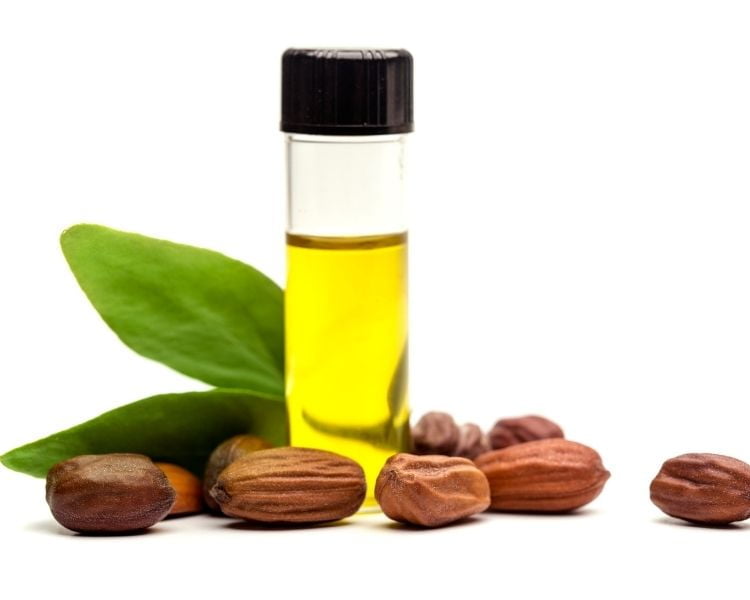
7 Carrier Oils and Their Benefits
- Coconut Oil: Rich in fatty acids, coconut oil penetrates the hair shaft better than most other carrier oils. It helps to moisturize, strengthen hair, and add a healthy shine.
- Jojoba Oil: Jojoba oil closely mimics the natural oil (sebum) our body produces. It moisturizes the scalp, reduces hair breakage, and balances oil production.
- Almond Oil: Enriched with Vitamins E and B, almond oil nourishes and strengthens hair. It is excellent for treating dry scalp and dandruff.
- Olive Oil: Olive oil is rich in antioxidants and nourishes the scalp, promotes hair health, and fights off the damage caused by free radicals.
- Grapeseed Oil: Grapeseed oil is high in linoleic acid and Vitamin E, promoting hair growth and health. It is also lightweight and won’t leave your hair feeling greasy.
- Avocado Oil: An excellent source of Vitamins A, D, and E, avocado oil helps provide a protective barrier and can rejuvenate and moisturize the hair.
- Argan Oil: Often referred to as ‘liquid gold’, Argan oil is rich in antioxidants, essential fatty acids, and vitamin E, which can help to moisturize the scalp, boost shine, and tame frizz.
Side Effects and Potential Risks
While essential oils offer numerous benefits, it’s essential to be aware of potential side effects and risks. Some people may experience allergic reactions or skin sensitivities when using essential oils.
It’s important to note that essential oils should always be diluted before use and never applied directly to the scalp. If you have any underlying medical conditions or are pregnant, consult with a healthcare professional before using essential oils.
Additionally, if you experience any adverse reactions such as irritation or allergic reactions, discontinue use immediately.
Incorporating essential oils into your hair care routine can lead to healthier and stronger hair. Remember to always use high-quality, pure essential oils and perform a patch test before regular use. With regular application, you may see improvements in hair thickness, scalp health, and overall hair growth.
Alternative Methods for Hair Growth
While essential oils can help promote hair growth, there are also other methods you can incorporate into your hair care routine for healthier and stronger hair. Some alternative methods include:
- Proper nutrition: Eating a balanced diet rich in vitamins and minerals can improve the health of your hair.
- Scalp massages: Massaging the scalp with gentle pressure can stimulate blood flow to the hair follicles, promoting hair growth.
- Reducing stress: Stress can contribute to hair loss and thinning. Practicing relaxation techniques such as meditation or yoga can help reduce stress levels.
- Using gentle hair care products: Harsh chemicals in shampoos and styling products can damage the scalp and hair. Switching to natural or sulfate-free products can help improve hair health.
Last Words from The More Clinics
Essential oils have proven their worth in the journey to attain healthy hair. Some people struggle with extensive hair loss, brittle hair or other scalp issues, and these oils can help alleviate the problem. However, it’s essential to remember that each individual is different, and what works for one may not work for another. It’s always best to consult with a healthcare professional before incorporating essential oils into your hair care routine.
At the More Clinics Turkey we offer various hair restoration procedures such as hair transplants to help individuals achieve their desired results. Our team of experts is dedicated to providing personalized treatments and ensuring the utmost safety and satisfaction of our clients. Contact us today to learn more how we can help with your hair care needs.
GET A FREE CONSULTATION!
Let’s Start Planning Your Treatment %100 Guarantee Results.
Frequently Asked Questions
Yes, essential oils can be used for all hair types. However, it’s essential to choose the right oil based on your specific hair concerns. For example, individuals with dry hair may benefit from jojoba oil, while those with oily hair can use cedarwood oil.
The frequency of application depends on your hair type and the specific oil. In general, it’s recommended to use essential oils 2-3 times a week. Overuse may lead to scalp sensitivities.
While essential oils offer many benefits, they may not completely replace traditional hair care products. They work best when used in conjunction with a regular hair care routine.
No, essential oils should not be ingested. They are highly concentrated and can be toxic when consumed. They should only be used topically or diffused for aromatherapy.
Essential oils can help stimulate hair growth on bald spots to some extent, but the results may vary from person to person. It’s best to consult with a dermatologist for severe hair loss issues.
Pregnant women should use essential oils with caution. It’s advisable to consult with a healthcare professional before using essential oils during pregnancy. Related Post : Hair Loss in Women Guide.
Medically Reviewed by Dr. Seda Erdoğan who specialized on Hair Transplants, Dermatology
